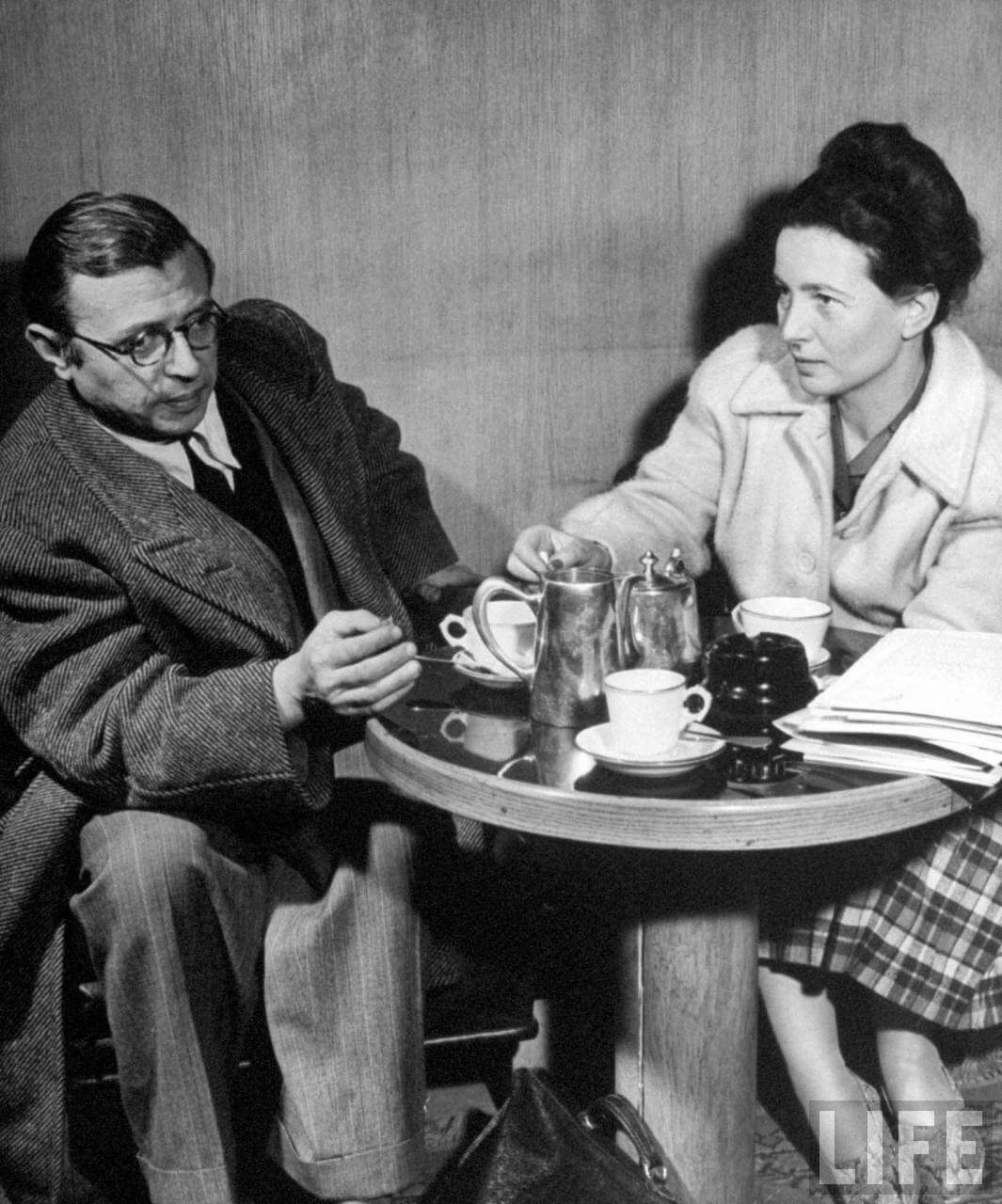Bad Faith at Sartre’s Café

It may be of interest to note that post-World War II feminism (the “second wave”) was written-into-being by Simone de Beauvoir, a gifted French philosopher, in The Second Sex (1949). It was conscientiously researched and replete with examples that showed how unfair and arbitrary were the predicaments it cited. Beyond its vivid illustrations, the book had a theoretical framework taken over from Jean-Paul Sartre. Sartre was the man she loved till his death and beyond. From the start, their relationship was conceived as nonmonogamous. How they got through that is not something I want to deal with here.
Sartre’s magnum opus was Being and Nothingness (1943), where he developed his own version of existentialism. His was a theory of how to live a truthful life — how not to be a phony. To phoniness, he gave the name of “bad faith” (mauvaise foi).
That turns out a rather tricky concept to get hold of, so Sartre explains it with several illustrative types of bad faith. The first type is shown by an imaginary young woman who has agreed to meet a young man for the first time. At a café.
The fictional young people set out to get acquainted. Their conversation starts on a fairly lofty level. Sartre doesn’t say what they are talking about but perhaps it’s some ideals they share. Of the young woman, Sartre says, “she does not quite know what she wants.” Respect? “She would find no charm in a respect which would be only respect.” On the other hand, sexual desire, candid and unadorned, “would humiliate and horrify her.”
Suddenly the young man takes her hand between both of his. Now she has to decide what to do about that. Sartre describes her as dodging the decision. She continues to talk about high-level topics, meanwhile treating her hand as a passive physical object, disconnected from her high-sounding words.
In his bad faith museum, she is Sartre’s exhibit A, though I don’t think he explains what he’d like her to do instead. There’s an implication that she should own up to her own frank desires and let her new acquaintance lead her down the garden path to his place. It seems to me that one thing she would desire is that he not spoil their first date. There’s a rhythm in getting to know someone. He’s getting pretty far ahead of that rhythm.
Be that as it may, his courtship blunders are not what Sartre is spotlighting here. The focus will be on hers. It’s dishonest, in Sartre’s view, to treat oneself (or one’s hand) as an object that is merely physical. Why is that? Because, while we do have bodies and do live surrounded by physical things of all kinds, the attitudes we take toward such things lie within our power. We are metaphysically free. Our consciousness is devoid of infrastructures that could narrow or shape our freedom to interpret ourselves and our situations. On the other hand, it’s equally dishonest to treat oneself as wholly extra-physical – as pure spirit — since social and material contexts can’t be dodged. They are the occasions for our freely choosing how to relate to the contexts that we’re in.
So the young woman is wrong to treat her hand in his on the table as a thing for which she bears no responsibility – but equally dishonest to treat her consciousness as capable of soaring above its circumstances — as if uncontaminated by them.
Okay, got it? She’s in “bad faith.” Now, mind if I join the table? Let’s suppose our young man is Sartre himself (actually not an unrealistic supposition). He’s a formidable talker and intricate cogitator – a Walking Intellect, it would seem. Let’s imagine that, by the time the waiter has brought three coffees, he’s been able to convey his notions of “bad faith” to the girl.
Nobody asked me, but here I might chime in that it’s quite an old-fashioned womanly trait to want to gain approval from a powerfully influential man. No girl would want to be dismissed as Exhibit A for this philosopher’s concept of bad faith. Lord, he might even portray her in a book!
As long as I’m at the table, I might also remark that there was a time when women didn’t go out alone to meet young men at cafés. The youth came to call and be vetted by her parents and guardians. In those days, an uninvited hand at a garden table would be pushed away unceremoniously. A woman would have to do that, so as not to forfeit social approval. Whereas nowadays, she might feel equally obligated to leave her hand clasped in his two hands, for the same reason.
How many situations like Sartre’s case study of “bad faith,” orchestrated by theories-convenient-for-predators, have made their way into women’s short secret history of embarrassments?
De Beauvoir’s Second Sex, which has continued to define feminism into the current century, is framed by Sartre’s view that femininity is a choice that can be discarded at will. Hers was one application of the Sartrean view that the psyche itself has no internal structures and can be given its entire aim by acts of free choice. Also, the Sartrean psyche can be changed, in character and direction, just as freely from one instant to the next. If you believe that, as they say in Brooklyn, I’ve got a bridge I can sell you.
So, if I’m so smart, how would I handle the encounter? Let’s picture me as the young woman at the café table, and Sartre as the man I was there to meet. Between worrying about French grammar, hoping to appear philosophically sophisticated and artfully up-on-the-latest, fearing to be nailed as an exemplar of bad faith but feeling not the faintest tug toward the Walking Intellect with the Hands – how would Abbie manage the situation?
With the utmost clumsiness, I can assure you.
In the days I was in Paris, when Sartre and de Beauvoir were to be found at their cafe, it wouldn’t have been hard for me to walk a few blocks over to St Germain des Pres. I’m beginning to see why I never did.




